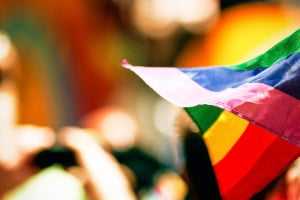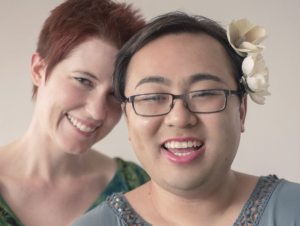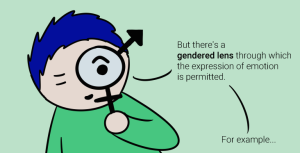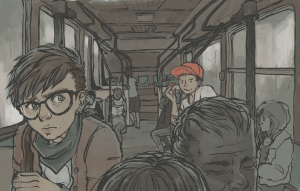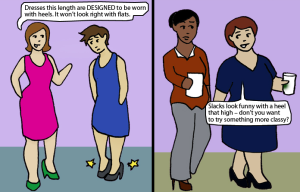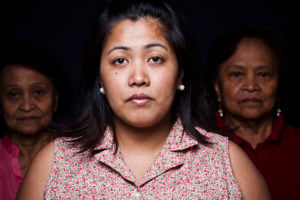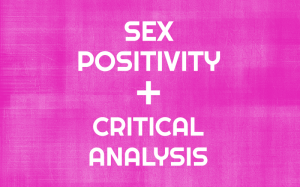I’ve always had mixed feelings about Pride events.
On the one hand, Pride can be fantastic and important. On the other hand, Pride in Cape Town – my home town – is notoriously exclusionary and inaccessible to marginalized members of the community.
In fact, Cape Town Pride is so exclusionary that local activists have organized The Alternative, Inclusive Pride – an event which focuses on inclusion, anti-oppression, and social justice activism.
This issue is certainly not unique to Cape Town.
LGBTQIA+ communities often come under fire for not being inclusive – and for good reason. Some communities can be full of racism, transphobia, biphobia, ableism, and sexism.
Pride can be incredibly important – it can be a space to discuss, connect, and celebrate while affirming one another and making strides in anti-oppression work. It can be a place for fun and entertainment while encouraging difficult, important conversations.
But if we’re leaving out the most marginalized members of our community, are we encouraging pride, or are we encouraging oppression?
In order to include all members of our community in events like Pride, we need to work hard at making these spaces accessible.
Here are some important things to consider when organizing and participating in Pride events.
1. Make It Accessible for People with Disabilities
It’s imperative that all members of the community are able to participate in Pride – including those with disabilities.
Think about how the event can cater to their needs. How can you make Pride a comfortable and accessible experience for them?
Venues for different events should have wheelchair ramps – ones that aren’t too steep – and doorways that are wide enough for people using wheelchairs and other mobility aids.
If there are guest speakers, organize sign-language interpreters. If there are movie screenings, use subtitles. If there is a march or parade, make sure the route is accessible for people with mobility aids by avoiding stairs and narrow walkways.
Also – and this is incredibly important – let people know about the measures you put in place in order to accommodate people with disabilities!
Often, people assume that places aren’t accessible unless it’s otherwise stated, so they avoid spaces that aren’t explicitly accessible for people with disabilities.
2. Think About the Entertainment You Hire
It’s important to think about who you hire as entertainment. Pride can be a great opportunity to help up-and-coming queer, trans, and intersex artists publicize their work.
Consider whether the entertainment that is hired reflects what Pride is really about.
Do the artists perform songs with heteronormative messages? Do they have messages about equality, inclusion, and anti-oppression? Do they have a history of blatantly and unapologetically oppressive behavior?
How are the entertainers being compensated for their time? If they volunteer to perform for free, that’s fantastic. But compensating someone for their efforts is important as it shows you value them and their work.
3. Host Events That Encourage Discussion About Issues Within the Community
Pride should not be apolitical.
In other words, an event like Pride shouldn’t involve avoiding the difficult political issues and discussions that affect our communities.
I was incredibly heartbroken a few years ago when the organizers of Cape Town Pride decided against having highly political events and discussions. The organizers argued that Pride isn’t the place to discuss issues which are “emotionally charged.”
The thing is, though, that being queer, trans, or intersex in this oppressive, hurtful society is emotionally and politically charged. Our very existence is already politicized.
Pride should involve considering the myriad of different experiences of people in the community. It shouldn’t only focus on the pleasant aspects of being queer, intersex, or transgender – it should also acknowledge the difficulties the community can face.
If we avoid the political issues in our community, we miss out on an excellent chance to tackle those difficulties.
Pride could be a great opportunity to host events that encourage members of the community to be introspective. For example, you could plan workshops about how cis queers could be better supporters of trans people, discussions around racism within the community, and panel discussions around biphobia and asexual erasure.
You could also organize events that focus on safer sex practices, vigils for members of the community who have lost their lives, and organize around lobbying for anti-discrimination laws.
4. Ensure It’s Accessible to Low-Income People
In many places around the world, Pride is seen as an expensive affair that is only accessible to the middle- and upper-classes.
And this shouldn’t be the case. Pride shouldn’t have to be bought, and it shouldn’t be exclusive to those who are well-off.
It’s imperative that organizers brainstorm ways to make Pride more accessible to low-income people. Reach out to the community and ask them about financial barriers which prevent them from participating in Pride.
Consider the location of the events. Is it in a high-income area? Is it in an area that’s central and easy to access via public transportation? It might be a good idea to organize wheelchair-accessible buses from low-income areas to the event.
Sometimes, Pride events have a cover charge that’s used to pay entertainers, hire a venue, and so on. If you need to have an entrance fee for some events, keep it to a minimum. Consider setting up a system where low-income people can apply for discounts or free entrance.
5. Consider Your Sponsors Very Carefully
Hiring venues, compensating entertainers and volunteers, and advertising are a few of the many expenses that it takes to organize Pride.
Since Pride can be super costly, organizers often need corporate sponsors in order to pull off events like Pride. In return, the sponsors are advertised to our community.
The problem with this is that sponsors can be inconsistent about their dedication to our community. Sometimes, the very companies that direct advertising toward us – through events like Pride – can actually be pretty bigoted.
In other words: They attempt to appeal to our community while harming our community. They might benefit from our patronage while subtly harming our community.
For example, a company might have a history of discriminating against queer and trans employees, but through sponsoring events like Pride, they appear to be open-minded and progressive.
Unfortunately, Pride provides the ample opportunity for sneakily bigoted companies to pander to our community without really supporting us.
It’s difficult to turn down money for these important events – even if the money is given by an atrocious company.
But if you can afford to be choosy about sponsors, do so.
Be proactive and reach out to businesses and corporations that have a history of supporting the community. It could be a good idea to approach small, local, socially responsible businesses – especially ones that are owned by members of the community – that could benefit from advertising at the event.
This way, it’s far more likely that the relationship between Pride and its sponsors is genuine and mutually beneficial.
6. Don’t Shame Those Who Don’t Participate
In my community and in others, I often see the sentiment that people can’t discuss the issues with Pride, or general issues in their community, if they don’t attend it every year.
It’s important that we don’t shame those who don’t participate in the event – particularly if it wasn’t made as accessible as possible.
There are many reasons why people can’t participate in Pride events, from family and work commitments to psychological difficulties and accessibility issues. Often, people can’t participate in Pride because they’re afraid of “outing” themselves to their family or community – and in a cisheterosexist world, that can be extremely dangerous.
Those who attend Pride events aren’t any better than those who don’t or can’t.
Not participating doesn’t mean that someone isn’t truly a part of the community, or that they don’t care about the rights and experiences of queer, trans, and intersex folk.
***
Pride is meant to promote community, equality, and anti-oppression – none of which could be possible if it’s not inclusive.
The organizers and participants of Pride need to prioritize accessibility. After all, making it more accessible will only strengthen our sense of community and anti-oppression work!
[do_widget id=’text-101′]
Sian Ferguson is a Contributing Writer at Everyday Feminism and a queer, polyamorous, South African feminist who is currently studying towards a Bachelor of Arts majoring in English and Anthropology. Originally from Cape Town, she now studies at Rhodes University in Grahamstown, where she works as vice-chair of the Gender Action Project. She has been featured as a guest writer on websites such as Women24 and Foxy Box, while also writing for her personal blog. Follow her on Twitter @sianfergs. Read her articles here.
Search our 3000+ articles!
Read our articles about:
Our online racial justice training
Used by hundreds of universities, non-profits, and businesses.
Click to learn more


